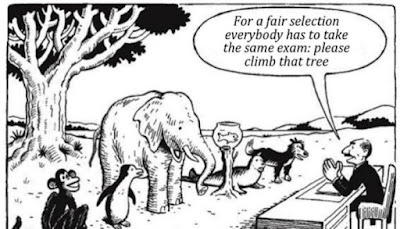The interviewer asked the elephant to climb that tree
TL;DR: Being a good interviewer is difficult; but it'll earn you a lot of bonus points and send you to heaven.
As an interviewer you're practically shaping the near and even possibly far future of the interviewee.
The very fault of every interviewer is to ask what he expects candidates to know, not to extract what the candidate knows best. Just as with enough make-up and wigs all air-hostesses are made to look identical, interviewers treat candidates from all walks of life as the same factory produced robots.
The lack of ability of an interview to mould himself to find the very best in every new candidate is what makes traditional interviews a terrible failure!
Any professional worth his salt should be much like a psychologist, he should be able to pick up in the short duration he spends with you whether you're fit for the role you applied for, and even be able to suggest where you'd fit better.
Unfortunately, here's what happens behind the scenes. Full time employees/professors/professionals are asked to recruit talent for a day by their organization. Most sulk the moment they're asked to do this. The organizations hand over a list of 20-50 questions along with their answers. The sulking interviewers then ask each candidate a random set of these questions - you're in luck if you're asked something you know!
If you're one of the above, try very hard to be a good interviewer, please? Be crystal clear of your ideal candidate; do your research, know exactly who you're looking for in various fields of your business. But don't stop at that; you should know you will never find your ideal candidate - look for someone who has worked on their own projects and talks about them with extreme passion. Passionate people, people who always want to do something are huge assets to have around - not only do they do their work well, they're generally fluent communicators that inspire others around them to get work done, and think laterally.
As an interviewer you're practically shaping the near and even possibly far future of the interviewee.
The very fault of every interviewer is to ask what he expects candidates to know, not to extract what the candidate knows best. Just as with enough make-up and wigs all air-hostesses are made to look identical, interviewers treat candidates from all walks of life as the same factory produced robots.
This is exactly what happens. Horses, dogs, elephants and fish are treated the same.
The lack of ability of an interview to mould himself to find the very best in every new candidate is what makes traditional interviews a terrible failure!
Any professional worth his salt should be much like a psychologist, he should be able to pick up in the short duration he spends with you whether you're fit for the role you applied for, and even be able to suggest where you'd fit better.
Unfortunately, here's what happens behind the scenes. Full time employees/professors/professionals are asked to recruit talent for a day by their organization. Most sulk the moment they're asked to do this. The organizations hand over a list of 20-50 questions along with their answers. The sulking interviewers then ask each candidate a random set of these questions - you're in luck if you're asked something you know!
If you're one of the above, try very hard to be a good interviewer, please? Be crystal clear of your ideal candidate; do your research, know exactly who you're looking for in various fields of your business. But don't stop at that; you should know you will never find your ideal candidate - look for someone who has worked on their own projects and talks about them with extreme passion. Passionate people, people who always want to do something are huge assets to have around - not only do they do their work well, they're generally fluent communicators that inspire others around them to get work done, and think laterally.


Comments
Post a Comment